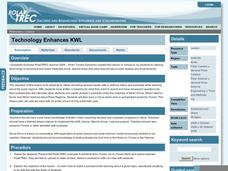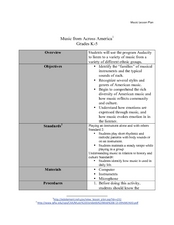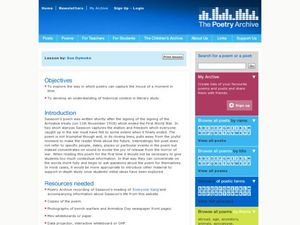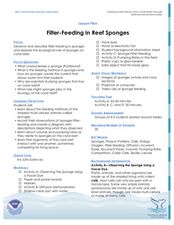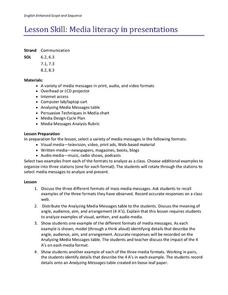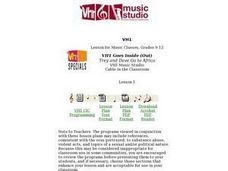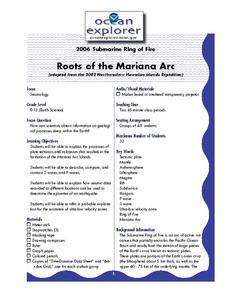Curated OER
Harvesting the River Lesson Plan: Taking an Oral History
Young scholars practice researching history through oral traditions. In this U.S. History lesson, students examine an online exhibit titled Harvesting the River, in which young scholars interview someone from the story. ...
Curated OER
Crosby, Stills, Nash and Young: Exploration of Live vs. Recorded
Students examine the differences between live and recorded music using the music of Crosby, Stills, Nash and Young.
Polar Trec
Technology Enhances KWL
To introduce learners to the ways people share information through the use of technology, the class makes podcasts. Each child chooses anything he is curious about regarding the Arctic or Antarctic regions. Learners then complete a KWL...
Curated OER
Structure of Natural Narratives
Class pairs select a prompt from a provided list and tell (and record) their story to their partner. They then examine linguist William Labov's model for natural narratives, and apply his model to their tale. Next, class members watch...
Curated OER
Music from Across America
Young scholars complete a unit of lessons on a variety of types of American music. They record their impressions of music samples on a worksheet, identify types of instruments, and choose a musical selection for their family to respond to.
Macmillan Education
Self-Awareness and Respect
The eighth in a series of 23 life skills exercises focuses on self-awareness and respect. Groups record, on the provided worksheets, words and phrases that signal respect, and generate lists of behaviors that signal respect.
Missouri Department of Elementary
R-E-S-P-E-C-T: A Basic Skill
Imagine seventh graders developing a school wide plan to promote respect in their school. That's the vision behind the second lesson plan in the R-E-S-P-E-C-T series. In preparation for designing a school-wide media campaign, class...
Curated OER
Everyone Sang - Moods in Poetry
Start by reading the poem "Everyone Sang" by Siegried Sassoon. The archive also houses an audio clip, so consider playing that instead of reading it aloud. After hearing the poem twice, middle and high schoolers will discuss a list of...
National Endowment for the Humanities
Frederick Douglass’s Narrative: Myth of the Happy Slave
The firsthand accounts of what it was like to be an enslaved person in the mid-1800s riveted a nation and the issue ultimately led to civil war. Using excerpts from Frederick Douglass's autobiography, budding historians examine what it...
Curated OER
Hark! The Sounds of Murder
Students analyze the Macbeth murder scene through textual analysis and construct the murder scene of Duncan through the use of sound only. In this Macbeth lesson, students work in groups to analyze the murder scene of Duncan from...
Curated OER
Filter Feeding in Reef Sponges
Students investigate the role of sponges in our oceans. In this biology lesson, students create a diagram visualizing how sponges bring food into their bodies through a filtering process. Students discuss the connections...
Curated OER
World War I
Eleventh graders investigate propaganda used during World War I. In this World War I lesson, 10th graders examine propaganda from the war and analyze war posters. Students then create their own propaganda posters on listed topics.
Curated OER
"The Lottery," by Shirley Jackson
Middle schoolers who are about to read the chilling tale, The Lottery, do some writing beforehand. They are asked to write how their lives would change if they won a huge lottery jackpot. Then, they read the short story, and will be...
Curated OER
Media Literacy in Presentations
Middle schoolers study the three types of mass media messages: visual media, written media, and audio media. After a class discussion which has them list examples of each, learners get into pairs and work on analyzing the "Four A's" in...
Curated OER
Keeping Your English Up to Date: Hoodie
Language is fluid, especially the English language. See how it is currently changing and will continue to change. Using the example of the term "hoodie," learners work through a week's worth of vocabulary, spelling, and critical thinking...
Oregon Education Professional Development Commission
The First Days
Designed for first-year teachers, this 116-page packet has it all. Questions you should ask administrators and fellow teachers, a checklist of things to do before school starts, a school-year calendar to record special school events and...
The Kennedy Center
Fairy Tale Variations
Here are two great lessons that work together and are inspired by the Stephen Sondheim musical Into the Woods. Young writers and actors will retell the story of "The Frog Prince" through games, improvisational script writing, and...
Curated OER
Romantic and 20th Century Period Music
Upper graders explore the similarities, differences, and depth of pop music from the Romantic era and the 20th century. They listen to selections that exemplify the Baroque, Romantic, and 20th century periods, then create presentations...
Curated OER
Trey and Dave go to Africa: Music
Trey from Phish and Dave from the Dave Mathews Band took a trip to Africa to explore music, culture, and history. Your class watches this episode from VH1's Music Studio to understand how African culture and music have influenced modern...
Curated OER
Roots of the Mariana Arc
Plumb the depths of the Submarine Ring of Fire and explore seismic waves with this lesson plan. Junior geologists simulate s-waves and p-waves, calculate their speeds, and then apply the data to discover the material that makes up inner...
Curated OER
Evaluating the Strength of Scientific Evidence: The Rediscovery of the Ivory-billed Woodpecker
A happy discovery occurred in Arkansas in 2004: a woodpecker, believed to be extinct since the 1940s, reappeared! Or did it? Middle to high school ecologists examine scientific evidence and use critical-thinking skills to determine...
Scholastic
Tell Us a Tale: Teaching Students to Be Storytellers
Encourage scholars to retell their favorite short story or folktale, adding personal details to make it their own. After reading their book of choice several times, story tellers retell a tale verbally to their classmates.
Baylor College
What's Is Soil Made Of?
It's time to roll up those sleeves and get a little dirty in the second lesson of this series on the science of food. Investigate where plants and animals get the minerals they need to live in this two-part exploration of soil. First,...
Baylor College
Do Plants Need Light?
Turn your classroom into a greenhouse with a instructional activity on plant growth. First, investigate the different parts of seeds, identifying the seed coat, cotyledon, and embryo. Then plant the seeds and watch them grow!...




